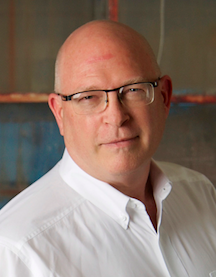Senior Metallurgical Engineer – Mentor, Peter Kullen

Peter is an experienced metallurgical engineer who works for a large integrated steel producer that manufactures a wide range of steel sheet and tubular products for the automotive, appliance, container, industrial machinery, construction, and oil and gas industries. He has a degree from Carnegie Mellon University, the fifth highest rated engineering school in the US. Peter works directly with over fifty of his company’s customers as a regional technical service engineer to make sure the steel used in their manufacturing process is optimally formulated for their applications and consults with his customers on ways to make their production processes that use his company’s steels more efficient. This kind of metallurgical engineering finds ways to reduce manufacturing costs and is critical to maintaining the quality of products manufactured in America and throughout the world. Engineering is also one of the highest paid professions where the demand for people in all areas of engineering is expected to remain strong well into the future.
Peter’s article is particularly interesting because he did not go to college wanting to become an engineer. He was an athlete who loved playing football and had no career path identified. He chose to attend Carnegie Mellon University after encouragement by his parents. He played on their football team and originally majored in economics not engineering. Because Peter was not focused on his studies, he graduated with a 2.0 average and could not find a job related to his major. He ended up taking a job as a lab technician in the Metallurgical Engineering Department at CMU. While working as a metallurgical technician, he took classes part time in Metallurgical Engineering. Five years later he received his engineering degree. Because he was focused while he was taking his engineering classes, he completed his degree with a 3.6 grade point average. After he graduated, he went to work for a government lab where he had top-secret clearance and did research on developing materials for such things as Naval nuclear reactors, high performance aircraft engines and protective surfaces for advanced vision systems used in military aircraft. After a year he went back to Carnegie Mellon as a research scientist. He spent eight years in that position before moving to a steel company where he worked with their mills to improve their production processes. He also wrote their quality and procedures manuals and then later moved into his present position where he works directly with customers in the field to provide them the best steels for their applications and shows them ways to improve their manufacturing processes. Peter is a good example of someone who like many young people first struggled finding their career path but with persistence and effort built a successful professional career. His article will be of interest to anyone considering a career in engineering or being involved in manufacturing. It will also be of interest for people who want to learn more about how the high quality standards his and other American companies maintain have brought back some of the manufacturing that had previously been sent outside the US.
Overview
I grew up in the small town of Beaver, Pennsylvania, which is about thirty miles northwest of Pittsburgh. I liked athletics and loved to play football. Because I was concentrating on sports, I did not study in high school or take some of the advanced classes in math that would have helped me in college. Consequently, while I graduated with a 3.75, I didn’t know how to study. My SAT scores were well above average but not good enough to get into CMU without special consideration. The football coach petitioned to have me admitted and subsequently, I was able to get into Carnegie Mellon University. CMU is a division three school and does not offer football scholarships, therefore, I had to work in the steel mills in the summer to pay for college. I typically describe my college experience as my first college career and my second college career. In my first college career I really didn’t know how to study as I did not have good study habits in high school. I allowed myself to be distracted and spent my time on athletics and partying. As a result I did not do well academically in my first academic career. I also did not really know what I wanted to do for a career and the university asked me to take time off and reconsider my academic objectives. Taking their advice, I stayed out a year but sat out for a semester and worked.
My second academic career began when I went back. At this point I became focused on academics and a career. I needed a 3.0 for the next two semesters to graduate with a 2.0 GPA. The challenge was substantial considering my past performance but I did it and graduated with a 2.0 GPA and a degree in economics. More important in the course of finishing my Economics degree I took several courses as electives and I found a course of study that really interested me. I was convinced that Metallurgy was the career for me. I knew I couldn’t afford to take on the debt that it would take to get my degree in Metallurgical Engineering and Materials Science. So I started looking for a way to get the degree without having to reach into my pockets to pay for it. I discussed this with the Dean of Academics and he suggested I work for the university full time and go to school part time. This was my solution! I applied for a number of jobs and got a job as a lab clerk. Eventually, I ended up working as a lab technician for the Metallurgical Engineering Department at the university. CMU is rated one of the top five engineering schools in the US and working in this lab and being exposed to all the creative research kept me focused on my studies as did the graduate students that I worked with who got me interested in engineering. So while I worked full time, I took two classes a semester. It took me five years to complete my engineering degree that way. In this environment it was great fun to have conversations about metals and materials. The Professors always were engaging and I began to see them as people that were concerned about me and wanted to see my success. The grad students pushed me and held me accountable and helped me stay focused. In the end I graduated and I was surprised to see I had a graduated with at a 3.2 GPA in my major.
My good grades and the fact that my degree was from one of the top engineering schools comparable to MIT and Stanford opened doors for me. I got my first engineering job working in at the Naval Research Laboratory in Washington D.C. I had a top-secret clearance and worked on projects developing materials for nuclear reactors, high performance aircraft engines and other military applications. I worked there for a year and then took a job at the Carnegie Mellon Research Institute so that I could be closer to home and help my parents. As a research scientist in advanced materials, I developed things like materials with harder, diamond like surfaces that were ten to twenty atom layers thick that we used on tooling like the dies that would punch out 1,800 pop can tops a minute. As a consumer, you expect these tabs to open every time and the companies making these kinds of containers need their tooling to be precise over long production runs. After working in materials research for eight years at the CMU Research Institute, I then moved to the US Steel Company where I am employed today.
At the steel company, I first designed systems to maintain quality in the production process and wrote the quality control manuals and operating procedures for all the mills. I also developed steel practices for a variety of steel products used by companies like General Electric’s locomotive division, Continental Can, the auto companies, a number of businesses that make heat exchangers for power plants, tubular goods for the oil and gas industry and metals used in nuclear plants. I worked with these companies to come up with formulas for our customer’s specific applications.
I like dealing directly with our customers in the field and a few years ago took the job I have now as a technical service engineer where I consult with manufactures using our steel. I currently have fifty-three customers in ten states. I not only make sure our steel products are meeting quality standards and performing well for our customers, I also consult with customers on their manufacturing processes. For example, one of our customers manufactures steel roofing tiles from our coiled steel. To manufacture this roofing product, they would first cut blanks from the coils of our steel and then run the blanks through a fourteen-stage die. They were not getting the efficiency they needed in their production process because at one early stage the shingle was not moving cleanly through the die. I saw that there was nothing wrong with our steel and made some suggestions to change the shape of the surface of the blanks so they would move more easily though the dies, which improved their manufacturing efficiency and product quality. Another example was when we closed down a coiled steel mill in the South that supplied customers along the Gulf Coast and starting shipping coiled steel from a plant further north. Because the steel was moving from a comparatively low humidity environment to part of the country with a lot of moisture, the higher humidity was causing the steel’s surface to rust. We often oil steel to prevent this from happening. But in this case the steel was being used to manufacture fifty-five gallon drums, a product with a narrow profit margin. They didn’t want to go to the trouble and expense of having to remove the oil so the surface would be ready for painting. I suggested another economical way to package the coils to prevent moisture from getting to the surface of the coils that prevented the rust problem during the time it takes to ship our steel coils from the mills to our customer.
The Importance of Quality in Manufacturing
Our company and all the manufacturers who use our steel all emphasize quality throughout the manufacturing process. The US did get behind in quality controls in some areas of manufacturing during the 1970s and 1980s particularly in automobiles. This was a rude awakening for these US companies. But they learned and quality is now an important component of the entire manufacturing chain in the US. This includes not only ensuring quality in the manufacturing process itself but also includes better and more efficient product designs and making sure that parts suppliers meet the same high quality requirements. Quality is also an issue in shipping and warehousing to ensure the condition, availability, and timely delivery of products in transit. For a steel supplier like us, this means not just efficient steel formulations and timely delivery but also consulting with them on ways to make their production and assembly process more efficient.
In the past there have been a lot of manufacturing companies that moved their production outside the US primarily to save on labor costs. But some of them are finding that it is harder to maintain quality in these countries and that higher quality can more than offset the lower labor costs. Recently General Electric moved their entire appliance manufacturing back from Mexico to Lexington, Kentucky. Master Lock also moved their manufacturing back to Wisconsin from China. The emphasis on quality from American steel suppliers like us as well as companies all along the supply and distribution chain means US manufacturing is now retaining and once again growing our country’s manufacturing base
How to Prepare in High School for a Career in Engineering
- Develop good study habits in high school and get the best grades you can. Your high school transcript is the first record of your personal achievement and is important for you to get accepted into an engineering college.
- Take the difficult math and science courses in high school. They will help you when you enter any college engineering program. Most high schools offer advanced classes in calculus and advanced algebra. I didn’t take these and found I was at a disadvantage when I started my first year of engineering classes.
- Your SAT and ACT tests are important with some colleges emphasizing one over the other. You can buy workbooks that will help you study for these tests and some high schools also offer classes that help you. Prepare for these tests before you take them so you will score higher.
- Get involved in some school activities. This will help you when you apply for scholarships. Colleges want students who are well rounded and will interact well with other students. Participating in a variety of school activities is evidence of this.
- Get with the counselors at your high school and at the colleges you apply to and learn about all the scholarships that might be available. Unless you come from a rich family, if you have good grades in high school and good SAT/ ACT test scores there should be some scholarships available to you from the college’s scholarship fund as well as from private scholarship funds and companies interested in graduating more engineers in America.
- Go to the best engineering school you can afford. Graduating from a respected school like Carnegie Mellon opens a lot of doors to that first job and gets you a higher starting salary.
Summary
Metallurgical engineering is a profession that is an important part of almost all types of manufacturing. It offers an interesting career where you are not only able to develop innovative materials and manufacturing processes, but also meet a lot of interesting people who are passionate about developing new materials and processes and producing quality products. It is a career where you are often given a lot of responsibility immediately after graduation to apply what you have learned. There are also a lot of areas in this kind of engineering where you can work in things like process design and engineering research or you can move into management or marketing your company’s products if you add an MBA. Many engineers also start their own companies once they gain experience because they know how to develop new products and processes and how to build equipment. Engineering also offers one of the highest starting salaries and best long-term compensation of any profession. I would recommend that any of you who are good at math and want the opportunity to create things that will help society consider engineering as a career.
US Bureau of Labor Statistics Salary Survey for Materials Engineers
These engineers evaluate materials and develop machinery and processes to manufacture materials for use in products that must meet specialized design and performance specifications and also develop new uses for known materials. This engineering category includes those engineers working with composite materials or specializing in one type of material, such as graphite, metal and metal alloys, ceramics and glass, plastics and polymers like metallurgists and metallurgical engineers, ceramic engineers, and welding engineers.
This occupation is versatile both in the nature of the work it does and in the industries in which its expertise can be put to use. Because they are not as specialized as other engineers, materials engineers are employed in a wide range of industries, including major manufacturing industries, consulting and engineering services, research and development firms, and wholesale trade. This versatility arises from the fact that these engineers’ expertise focuses on reducing internal costs, making their work valuable for many industries.
Pay
Average pay for this profession is $87, 690 at the time of the last BLS study in 2014. Pay for the highest 10% was over $138,450 and $53,290 for the lowest 10%.










My name is Kelvin Sewoekpor, a student of KNUST-Ghana reading Metallurgical Engineering, and i would like for you to mentor ne in my field of study.